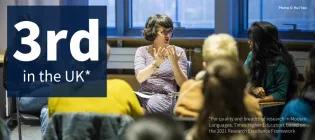What's it like to study here?
The first lecture in Russian was given at the University in 1919, and Russian Studies was introduced as a degree programme in 1949, the first of its kind in Scotland.
Today, we have an established community of staff, research students, and undergraduates in Russian Studies, and masters students in film, comparative literature, and intermediality - the relationship between different art forms.
Our expertise covers a wide range of areas, including:
- social, political and cultural perspectives on Russian language
- transnational Russian culture
- Russian literature
- media
- film studies
- theatre studies
- comparative literature
Working with colleagues elsewhere in LLC, and across the wider University, we are able to support research which crosses boundaries between languages and/or disciplines, including:
- linguistics
- politics
Our graduates tell us that they value LLC’s friendliness, the connections they make here and the in-depth guidance they receive from our staff, who are published experts in their field.
We have received many prestigious research awards, including the AHRC-awarded projects:
- ‘Global Russians: Transnational Russophone Networks in the UK’ (2016-2021)
- 'Reconfiguring the Canon of Twentieth-Century Russian Poetry, 1991-2008’ (2010-2013)
On campus and in the city
We are based in the historic heart of a world-leading festival city, close to the National Library of Scotland and National Museum of Scotland.
The Main University Library is just across the square from us. It holds academic books, journals and databases, including around 14,400 titles in the Russian language. E-resources include Russian newspapers, TV and radio channels.
As part of our postgraduate community, you will be immersed in a world of knowledge exchange, with lots of opportunities to share ideas, learning and creative work.
Activities range from a regular seminar series in European Languages and Cultures (with talks by staff, research students and visiting speakers), to film screenings, workshops, and national and international conferences.


